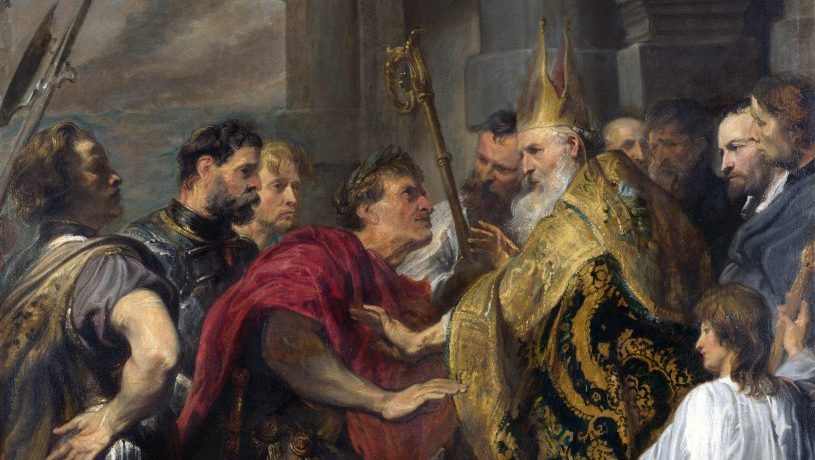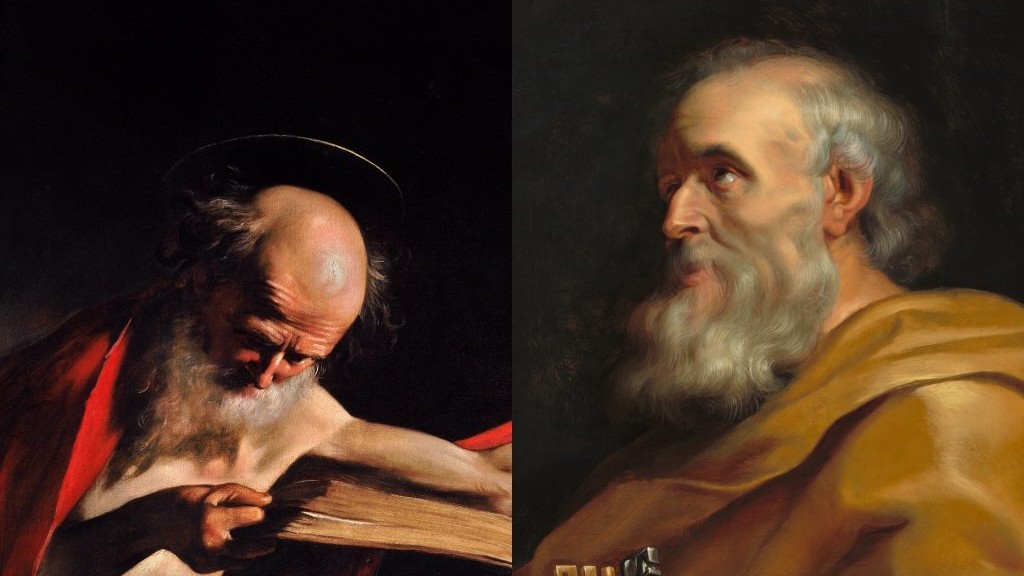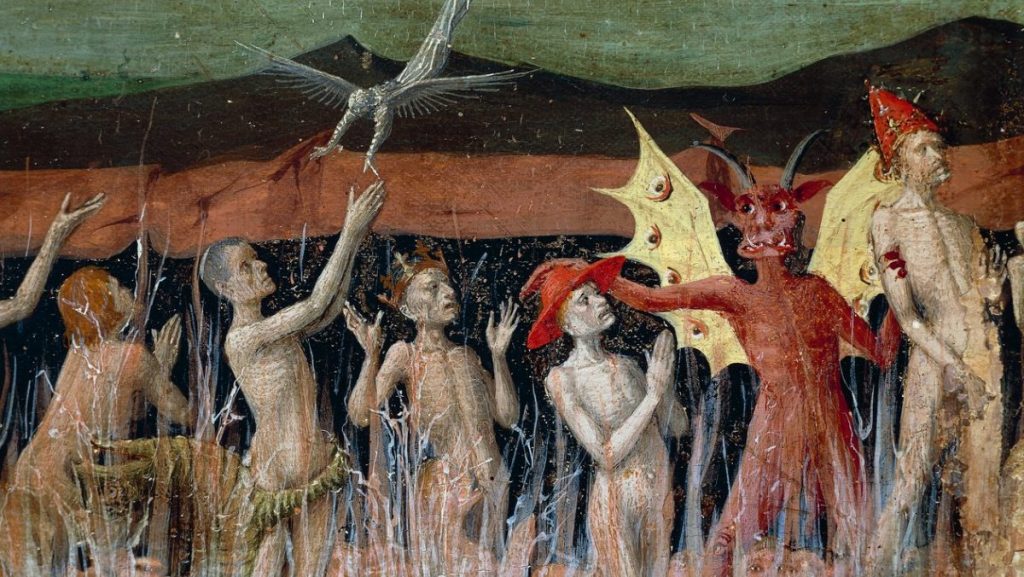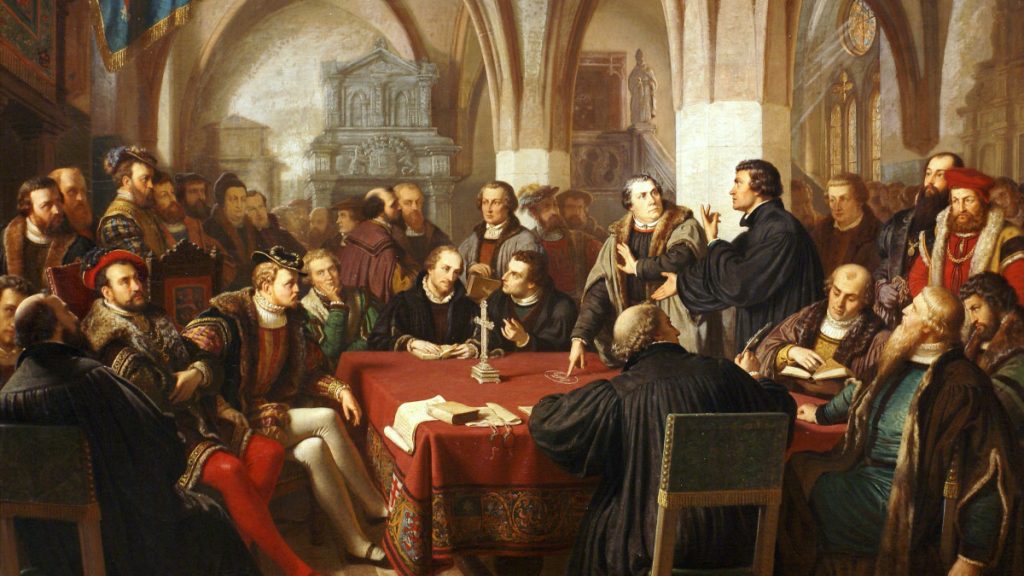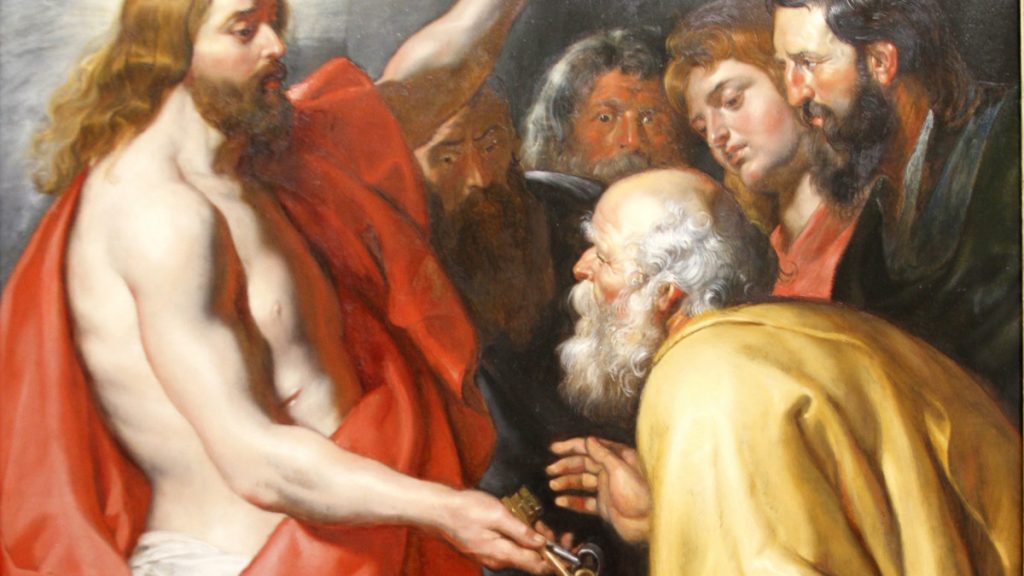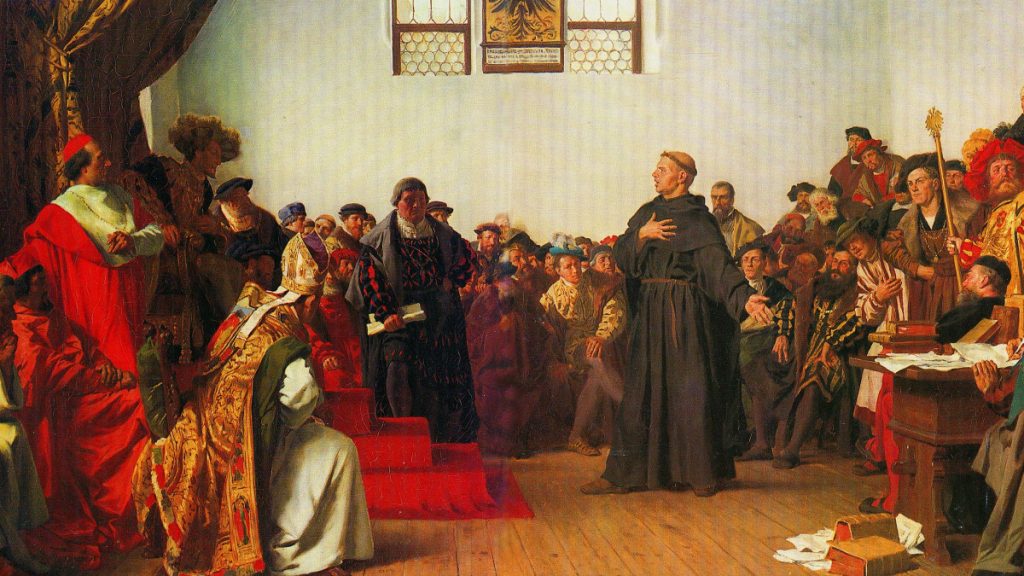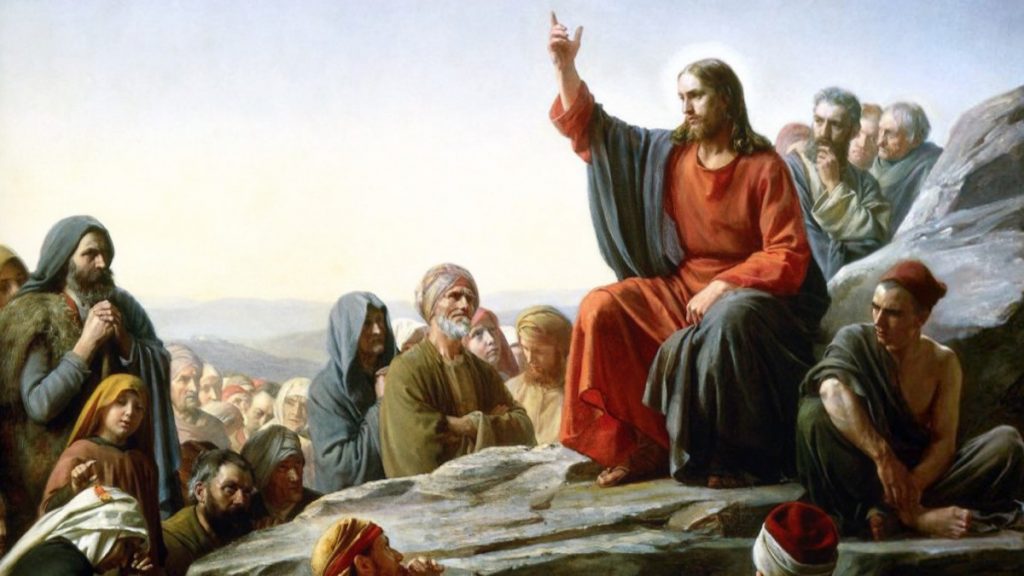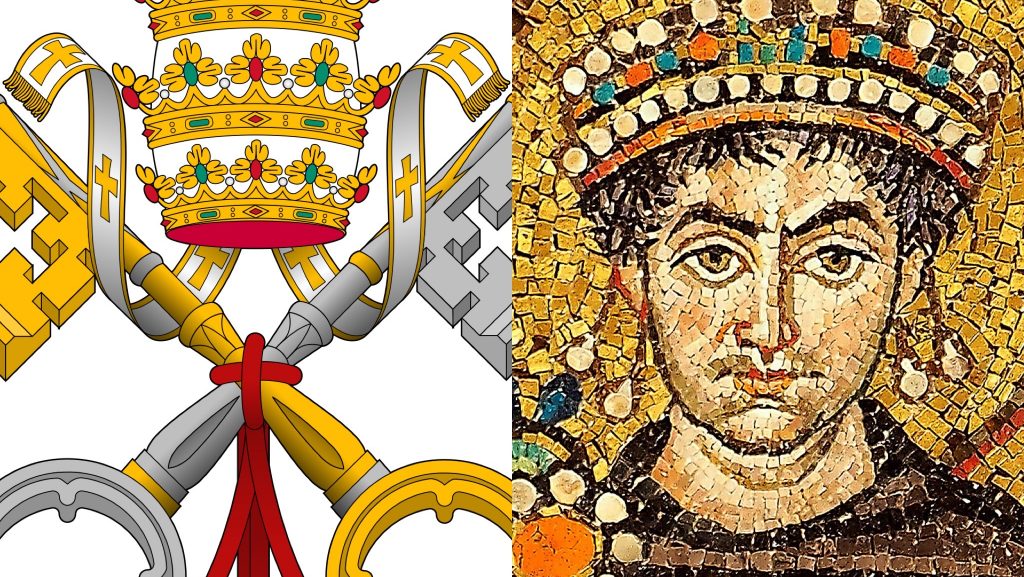(Updated July 15, 2025)
This Author Quote Archive collects pertinent quotes from the Church Father, St. Ambrose of Milan.
Next to each quote are the Topic Quote Archives in which they are included.
This Quote Archive is being continuously updated as research continues. Quotes marked with “***” have not yet been organized into their respective Topic Quote Archives.
Treatises
St. Ambrose of Milan, Concerning Virgins (377)
(§6) Let, then, the life of Mary be as it were virginity itself, set forth in a likeness, from which, as from a mirror, the appearance of chastity and the form of virtue is reflected. From this you may take your pattern of life, showing, as an example, the clear rules of virtue: what you have to correct, to effect, and to hold fast.
(§7) The first thing which kindles ardor in learning is the greatness of the teacher. What is greater than the Mother of God? What more glorious than she whom Glory Itself chose? What more chaste than she who bore a body without contact with another body? For why should I speak of her other virtues? She was a virgin not only in body but also in mind, who stained the sincerity of its disposition by no guile, who was humble in heart, grave in speech, prudent in mind, sparing of words, studious in reading, resting her hope not on uncertain riches, but on the prayer of the poor, intent on work, modest in discourse; wont to seek not man but God as the judge of her thoughts, to injure no one, to have goodwill towards all, to rise up before her elders, not to envy her equals, to avoid boastfulness, to follow reason, to love virtue. When did she pain her parents even by a look? When did she disagree with her neighbors? When did she despise the lowly? When did she avoid the needy?…
St. Ambrose, Exposition of the Christian Faith (c. 379)
(Book 4, §§26, 57) | ROCK | KEYS | PRIMACY
(§26) Go your way, therefore, to my brethren—that is, to those everlasting doors, which, as soon as they see Jesus, are lifted up. Peter is an everlasting door, against whom the gates of hell shall not prevail [Matt. 16:18]. John and James, the sons of thunder, to wit [Mark 3:17], are everlasting doom. Everlasting are the doors of the Church, where the prophet, desirous to proclaim the praises of Christ, says: “That I may tell all your praises in the gates of the daughter of Sion” (Ps. 9:14)…
(§57) Moreover, that you may know that it is after His Manhood that He entreats, and in virtue of His Godhead that He commands, it is written for you in the Gospel that He said to Peter: “I have prayed for you, that your faith fail not” (Luke 22:32). To the same Apostle, again, when on a former occasion he said, “You are the Christ, the Son of the living God,” He made answer: “You are Peter, and upon this Rock will I build My Church, and I will give you the keys of the kingdom of heaven” (Matt. 16:18). Could He not, then, strengthen the faith of the man to whom, acting on His own authority, He gave the kingdom, whom He called the Rock, thereby declaring him to be the foundation of the Church? Consider, then, the manner of His entreaty, the occasions of His commanding. He entreats, when He is shown to us as on the eve of suffering: He commands, when He is believed to be the Son of God.
(Book 5, §§1-2) | PRIMACY
(§1) “Who, then, is a faithful and wise servant, whom his lord has made ruler over his household, to give them meat in due season? Blessed is that servant, whom his lord when he comes shall find so doing” (Matt. 24:45-46). Not worthless is this servant: some great one ought he to be. Let us think who he may be.
(§2) It is Peter, chosen by the Lord Himself to feed His flock, who merits thrice to hear the words: “Feed My little lambs; feed My lambs; feed My sheep” [John 21:15-19]. And so, by feeding well the flock of Christ with the food of faith, he effaced the sin of his former fall. For this reason is he thrice admonished to feed the flock; thrice is he asked whether he loves the Lord, in order that he may thrice confess Him, Whom he had thrice denied before His Crucifixion.
St. Ambrose, The Holy Spirit (381)
(§76) There are, however, many who, because we are baptized with water and the Spirit, think that there is no difference in the offices of water and the Spirit, and therefore think that they do not differ in nature. Nor do they observe that we are buried in the element of water that we may rise again renewed by the Spirit. For in the water is the representation of death, in the Spirit is the pledge of life, that the body of sin may die through the water, which encloses the body as it were in a kind of tomb, that we, by the power of the Spirit, may be renewed from the death of sin, being born again in God.
(§77) And so these three witnesses are one, as John said: “The water, the blood, and the Spirit” (1 John 5:8). One in the mystery, not in nature. The water, then, is a witness of burial, the blood is a witness of death, the Spirit is a witness of life. If, then, there be any grace in the water, it is not from the nature of water, but from the presence of the Holy Spirit.
St. Ambrose, Jacob and the Happy Life (c. 386)
(§§35-36)1 ***
(§35) What great mysteries these are! There, there is the Church of God, in which God appears and speaks with His humble servants. There the idols of the nations are taken away and buried, for the faith of the Church has destroyed every 165 | 166 practice of paganism. But why, I ask, did he bury them under a turpentine tree? Assuredly that is an unproductive species. And so the gods of the nations are there, where no fruit is. There the earrings of the pagans are buried, and they gave them to Jacob [Gen. 35:4] so that now they could grow used to hearing a new language and could forget the old sleep of unbelief, and so that their ears could become deaf to sacrilege and be purified by grace…It was there that he said that chastity had been corrupted, where the idols of the nations were buried [Acts 15:20; Rom. 1:18-25]. But the truth of the Church did not shelter unbelief; rather it buried it and blocked the ears of the pagans.
(§34) It is appropriate, too, that the holy Rachel was buried there, for all those who are baptized in Christ are buried together with Him. So we are taught by the Apostle, who says, “For we were buried with him by means of baptism into death, in order that, just as he has arisen from the dead, raised up through his own power, so we also may rise up by his grace” (Rom. 6:4). Every deceit of the pagans really is buried at the time when someone has been washed free of his vices, because our old man, fastened to the cross, now does not know how to be a slave to the old sin. It is appropriate as well that a column is set up over Rachel’s grave, because the Church is the column and mainstay of the truth [1 Tim. 3:15].
St. Ambrose, On Abraham (387)
- The Sacrament of Marriage, Divorce, and Contraception | Book 1, Part 7, §59
(Book 1, Part 7, §59)2
It is allowed to none to know a woman other than his wife. Therefore, the right to marry is given to you, lest you fall into a snare and sin with a strange woman. You are bound to your wife; do not seek release because you are not permitted to marry another while your wife lives [Rom. 7:2-3]. For to seek another woman when you have your own is a crime of adultery more serious when you think that authority for your sin may be obtained from the Law. The sin would be more tolerable if it were to lie hidden than if its justification were to be usurped: nor is sinning with another man’s life alone adultery, but every union which lacks the legality of marriage.
St. Ambrose, Concerning Repentance (388)
- The Papacy and the Invincibility of the Church | Book 1, Ch. 7, §33
- The Sacrament of Confession | Book 1, Ch. 2, §§6-7; Ch. 7, §33
(§6) They [the heretical Novatians] affirm that they are showing great reverence for God, to Whom alone they reserve the power of forgiving sins. But in truth none do Him greater injury than they who choose to prune His commandments and reject the office entrusted to them. For inasmuch as the Lord Jesus Himself said in the Gospel: “Receive ye the Holy Spirit: whosesoever sins ye forgive they are forgiven unto them, and whosesoever sins ye retain, they are retained” (John 20:22-23), who is it that honors Him most, he who obeys His bidding or he who rejects it?
(§7) The Church holds fast its obedience on either side, by both retaining and remitting sin; heresy is on the one side cruel, and on the other disobedient; wishes to bind what it will not loosen, and will not loosen what it has bound, whereby it condemns itself by its own sentence. For the Lord willed that the power of binding and of loosing should be alike, and sanctioned each by a similar condition. So he who has not the power to loose has not the power to bind. For as, according to the Lord’s word, he who has the power to bind has also the power to loose, their teaching destroys itself, inasmuch as they who deny that they have the power of loosing ought also to deny that of binding. For how can the one be allowed and the other disallowed? It is plain and evident that either each is allowed or each is disallowed in the case of those to whom each has been given. Each is allowed to the Church, neither to heresy, for this power has been entrusted to priests alone. Rightly, therefore, does the Church claim it, which has true priests; heresy, which has not the priests of God, cannot claim it. And by not claiming this power heresy pronounces its own sentence, that not possessing priests it cannot claim priestly power. And so in their shameless obstinacy a shamefaced acknowledgment meets our view.
And this confession is indeed rightly made by them [the heretical Novatians], for they have not the succession of Peter, who hold not the chair of Peter, which they rend by wicked schism; and this, too, they do, wickedly denying that sins can be forgiven even in the Church, whereas it was said to Peter: “I will give unto thee the keys of the kingdom of heaven, and whatsoever thou shalt bind on earth shall be bound also in heaven, and whatsoever thou shalt loose on earth shall be loosed also in heaven” (Matt. 16:19). And the vessel of divine election himself [St. Paul] said: “If you have forgiven anything to anyone, I forgive also, for what I have forgiven I have done it for your sakes in the person of Christ” (2 Cor. 2:10). Why, then, do they read Paul’s writings, if they think that he has erred so wickedly as to claim for himself the right of his Lord? But he claimed what he had received, he did not usurp that which was not due to him.
St. Ambrose of Milan, Commentaries on Twelve Psalms of David (c. 389)
- The Blessed Sacrament of the Holy Eucharist | Ch. 38, §25
(Ch. 38, §25)3
We saw the prince of priests coming to us, we saw and heard him offering his blood for us. We follow, because we are able, being priests, and we offer the sacrifice on behalf of the people. Even if we are of but little merit, still, in the sacrifice, we are honorable. Even if Christ is not now seen as the one who offers the sacrifice, nevertheless it is he himself who is offered in sacrifice here on earth when the body of Christ is offered. Indeed, to offer himself he is made visible in us, he whose word makes holy the sacrifice that is offered.
St. Ambrose of Milan, On the Mysteries (c. 390)
- The Sacrament of Baptism | Ch. 4, §20
- The Blessed Sacrament of the Holy Eucharist | Ch. 8, §47; Ch. 9, §§50, 53-54, 58
Therefore read that the three witnesses in baptism, the water, the blood, and the Spirit [1 John 5:7], are one, for if you take away one of these, the Sacrament of Baptism does not exist. For what is water without the cross of Christ? A common element, without any sacramental effect. Nor, again, is there the Sacrament of Regeneration without water: “For except a man be born again of water and of the Spirit, he cannot enter into the kingdom of God” (John 3:5). Now, even the catechumen believes in the cross of the Lord Jesus, wherewith he too is signed; but unless he be baptized in the Name of the Father, and of the Son, and of the Holy Spirit, he cannot receive remission of sins nor gain the gift of spiritual grace.
We have proved the sacraments of the Church to be the more ancient, now recognize that they are superior. In very truth it is a marvelous thing that God rained manna on the fathers, and fed them with daily food from heaven; so that it is said, “So man ate angels’ food” (Ps. 78:25). But yet all those who ate that food died in the wilderness, but that food which you receive, that living Bread which came down from heaven, furnishes the substance of eternal life; and whosoever shall eat of this Bread shall never die, and it is the Body of Christ.
(§50) Perhaps you will say, “I see something else, how is it that you assert that I receive the Body of Christ?” And this is the point which remains for us to prove. And what evidence shall we make use of? Let us prove that this is not what nature made, but what the blessing consecrated, and the power of blessing is greater than that of nature, because by blessing nature itself is changed…
(§53) …And this body which we make is that which was born of the Virgin. Why do you seek the order of nature in the Body of Christ, seeing that the Lord Jesus Himself was born of a Virgin, not according to nature? It is the true Flesh of Christ which crucified and buried, this is then truly the Sacrament of His Body.
(§54) The Lord Jesus Himself proclaims: “This is My Body” (Matt. 26:26). Before the blessing of the heavenly words another nature is spoken of, after the consecration the Body is signified. He Himself speaks of His Blood. Before the consecration it has another name, after it is called Blood. And you say, “Amen,” that is, “It is true.” Let the heart within confess what the mouth utters, let the soul feel what the voice speaks…
(§58) Wherefore, too, the Church, beholding so great grace, exhorts her sons and her friends to come together to the sacraments, saying: “Eat, my friends, and drink and be inebriated, my brother” (Song. 5:1). What we eat and what we drink the Holy Spirit has elsewhere made plain by the prophet, saying, “Taste and see that the Lord is good, blessed is the man that hopes in Him.” In that sacrament is Christ, because it is the Body of Christ, it is therefore not bodily food but spiritual. Whence the Apostle says of its type: “Our fathers ate spiritual food and drank spiritual drink” (1 Cor. 10:3), for the Body of God is a spiritual body; the Body of Christ is the Body of the Divine Spirit, for the Spirit is Christ, as we read: “The Spirit before our face is Christ the Lord” (Lam. 4:20). And in the Epistle of Peter we read: “Christ died for us” (1 Pet. 2:21). Lastly, that food strengthens our heart, and that drink “makes glad the heart of man,” as the prophet has recorded.
St. Ambrose, Hexameron (393)
- The Communion of Saints: Intercession and Relics | Book 5, Homily 8, Ch. 24, §90
- The Blessed Sacrament of the Holy Eucharist | Book 5, Homily 8, Ch. 24, §90
(Book 5, Homily 8, Ch. 24, §90)4
But now it is fitting time [Holy Thursday] that this discourse be brought to an end–a time for silence or for tears, a time in which is celebrated the forgiveness of sins. For us, too, in our holy rites that mystical cock crows, as the cock of Peter did in our discourse. May Peter, who wept so well for himself, weep also for us and may the benign countenance of Christ turn toward us. Let there come upon us the Passion of the Lord Jesus which daily forgives us our sins and effects the office of remission.
Biblical Commentaries
St. Ambrose, Exposition of Psalm 38
We have seen the High Priest coming to us; we have seen and heard him offering his blood for us. We priests follow, as well as we can, so that we may offer sacrifice for the people. Though we can claim no merit, we are to be honored in the sacrifice; for, although Christ is not now visibly offered, yet he is himself offered on earth when the body of Christ is offered. Moreover, it is made clear that he himself offers in us, since it is His words which sanctify the sacrifice which is offered.
St. Ambrose of Milan, Commentary on Psalm 118 (c. 387)
- Holy Mary, Mother of God | Ch. 22, §30
(Ch. 22, §30)6
Come, then, and search out your sheep, not through your servants or hired men, but do it yourself. Lift me up bodily and in the flesh, which is fallen in Adam. Lift me up not from Sarah but from Mary, a virgin not only undefiled, but a virgin whom grace had made inviolate, free of every stain of sin.
St. Ambrose, Commentary on the Gospel of Luke
- The Sacrament of Baptism | Book 2, §83
- The Sacrament of Marriage, Divorce, and Contraception | Book 8, §5
(Book 2, §83)7
“Now it happened that when all the people had been baptized, and when Jesus, too, had been baptized and was praying, Heaven opened and the Holy Spirit came down upon Him in bodily shape as a dove. Then a voice was heard from Heaven: ‘You are my Son in whom I am well pleased'” (Luke 3:21).
So, then, the Lord was baptized. It was not that He wanted to be cleansed, but that He wanted to purify and sanctify the waters. Then the waters washed by the blood of Christ who knew no sin [2 Cor. 5:21], would have power to baptize. It follows that whoever comes to the fountain of Christ will leave his sins there. Saint Luke wisely sums up what the other Evangelists had said, and leaves it to be understood that the Lord received baptism from John–without actually stating this. As for the Lord’s motive in being baptized, He Himself explains it in these words: “Let it be so for the present. For so it becomes us to fulfill all justice” (Matt. 3:15).
(Book 8, §5)8
So, you cast off your wife as though by right and without remorse. You cast her off and think it lawful? Yes, civil law allows it, I know, but divine law does not. You observe man-made laws, but I would caution you to fear God. Listen to the law of God to which even our own lawmakers defer: “What God has joined together, let no man put asunder” (Matt. 19:6).
Sermons
St. Ambrose, On the Death of Satyrus (379)
But he was not so eager as to lay aside caution. He called the bishop to him, and esteeming that there can be no true thankfulness except it spring from true faith, he inquired whether he agreed with the Catholic bishops, that is, with the Roman Church? And possibly at that place the Church of the district was in schism. For at that time Lucifer had withdrawn from our communion, and although he had been an exile for the faith, and had left inheritors of his own faith, yet my brother did not think that there could be true faith in schism. For though schismatics kept the faith towards God, yet they kept it not towards the Church of God, certain of whose limbs they suffered as it were to be divided, and her members to be torn. For since Christ suffered for the Church, and the Church is the body of Christ, it does not seem that faith in Christ is shown by those by whom His Passion is made of none effect, and His body divided.
St. Ambrose, Funeral Oration on the Death of Valentinian II (392)
- The Sacrament of Baptism | §51
(§51)9
But I hear that you are grieving because he has not received the sacrament of baptism. Tell me whether we have complete control over anything other than our motive, and our ability to ask? But he had already for a long time had that particular wish, namely that he should be initiated [baptized] before he came to Italy. And more recently he let it be known that he wished to be baptized by me. And for this more than for any other reasons, he thought that I ought to be summoned. Is he not therefore in possession of the grace which he intended to receive, in possession of the grace that he demanded? And because he asked, he received. And that is why the text says: “No matter by what kind of death the just man is forestalled, his soul will find rest” (Wis. 4:7).
Letters
St. Ambrose of Milan, Letter 2 (40): To Emperor Theodosius (December, 388)10
Have you not heard how, when Julian had ordered the Temple of Jerusalem rebuilt, those who were clearing the rubbish were burned by fire from heaven? Are you not afraid that this will also happen now? In fact, you should never have given an order such as Julian would have given.
St. Ambrose of Milan, Letter 40 (11): From the Council of Aquileia to Emperors Gratian, Valentinian, and Theodosius (May 381)11 ***
Even if he were not there, we would nevertheless have besought your Clemency not to allow disturbance to reach the Roman Church, head of the whole Roman world, and that sacred trust of the Apostles, whence flow all the rights of venerable communion upon all persons.
St. Ambrose of Milan, Letter 63: To the Church of Vercellae (396)
Imitate her [Mary], holy mothers, who in her only dearly beloved Son set forth so great an example of maternal virtue; for neither have you sweeter children, nor did the Virgin seek the consolation of being able to bear another son [ever-virgin].
Footnotes
- St. Ambrose, Michael P. McHugh, trans., The Fathers of the Church, Vol. 65: Saint Ambrose, Seven Exegetical Works (Washington, DC: The Catholic University of America Press, 1972), 165-66. ↩︎
- St. Ambrose, Theodosia Tomkinson, trans., Saint Ambrose of Milan: On Abraham (Etna, CA: Center for Traditionalist Orthodox Studies, 2000), 29. ↩︎
- Jimmy Akin, The Fathers Know Best: Your Essential Guide to the Teachings of the Early Church (San Diego: Catholic Answers Press, 2010), 302. ↩︎
- St. Ambrose, John J. Savage, trans., The Fathers of the Church, Vol. 42: Saint Ambrose, Hexameron, Paradise, and Cain and Abel (Washington, DC: The Catholic University of America Press, 1961), 225. ↩︎
- Henry Bettenson, trans., The Later Christian Fathers: A Selection from the Writings of the Fathers from St. Cyril of Jerusalem to St. Leo the Great (London: Oxford University Press, 1970), 186. ↩︎
- Jimmy Akins, The Fathers Know Best: Your Essential Guide to the Teachings of the Early Church (San Diego: Catholic Answers Press, 2010), 341-42. ↩︎
- St. Ambrose, Ide M. Ni Riain, trans., Commentary of Saint Ambrose on the Gospel According to Saint Luke (Dublin: Haleyon Press, 2001), 58. ↩︎
- St. Ambrose, Ide M. Ni Riain, trans., Commentary of Saint Ambrose on the Gospel According to Saint Luke (Dublin: Haleyon Press, 2001), 271. ↩︎
- St. Ambrose, JHWG Liebeschuetz, trans., Translated Texts for Historians, Vol. 43: Ambrose of Milan, Political Letters and Speeches (Liverpool: Liverpool University Press, 2005), 387. ↩︎
- St. Ambrose of Milan, Sister Mary Melchior Beyenka, OP, trans., The Fathers of the Church, Vol. 26: Saint Ambrose, Letters (Washington, DC: The Catholic University Press of America, 1954), 11. ↩︎
- St. Ambrose of Milan, Sister Mary Melchior Beyenka, OP, trans., The Fathers of the Church, Vol. 26: Saint Ambrose, Letters (Washington, DC: The Catholic University Press of America, 1954), 215. ↩︎
